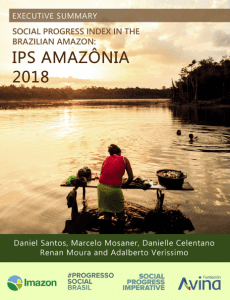Santos, D., Mosaner, M., Celentano, D., Moura, R. & Veríssimo, A. Social progress index in the Brazilian Amazon: IPS Amazônia 2018 Belém, PA: Imazon; Social Progress Imperative, 2018.
The Social Progress Index – SPI (Índice de Progresso Social – SPI in Portuguese) in a holistic manner measures the social and environmental progress of territories (countries, states, municipalities, districts, etc.). That index is the result of a partnership between academics at major research institutes such as the Massachusetts Institute of Technology (MIT), Harvard University (United States) and University of Oxford (United Kingdom). Various countries and subnational territories around the world have been adopting it. The SPI was conceived based on the understanding that development measures are insufficient when based only on economic indicators since economic growth without social progress results in environmental degradation, exclusion and social conflicts.
The SPI offers a different approach in the area by emphasizing results (outcomes) instead of investments (inputs). One should note that the low emphasis on results brings about institutional fragmentation and a variety of viewpoints (often with a strong ideological bias) that prove to be resistant to efforts, mediation and evaluation. Furthermore, the SPI is a robust method with the capacity of integrating a broad range of indicators and presenting them in a didactic manner, spatially distributed and comparable. In that way, it is possible to inform efforts by society, the government and private sector to enhance social progress.
The IPS Amazônia, originally published in 2014 under Imazon leadership, presented a detailed X-ray of the social and environmental status of all 772 Amazon municipalities for that year. It was the first state and municipal levels initiative done in the world. In fact, the institute developed an adaptation of the global scale SPI (countries) for the subnational scale. Others states, counties, districts and cities are adopting the SPI at the European Union, the United States, countries of Central America, Asia and Africa.
The SPI is made up of exclusively social and environmental indicators aggregated into three dimensions (Basic Human Needs, Foundations of Wellbeing and Opportunities) and 12 components. To that end, public data made available by governmental institutions or organized civil society make up the SPI. Since 2014, Imazon has worked with the #Progresso Social Brasil network and the Social Progress Imperative in preparing and disseminating the SPI in the Brazilian Amazon[2], referred to throughout this report only as the Amazon (Amazônia). Thus, as a first initiative, IPS Amazônia 2018 is also a product of this partnership and is available at the www.imazon.org.br and www.progressosocial.org.br sites. Furthermore, the data and results broken down at a municipal level are available at www.ipsamazonia.org.br. the IPS Amazônia 2018 reveals that there has been a slight reduction in the index compared to IPS Amazônia 2014: from 57.31 to 56.52. Overall, the Amazon region still faces numerous social and environmental problems, including worsening public safety, precarious basic sanitation and access to treated water, deficiencies in higher education, little guarantee for individual rights and the recent increase in deforestation.
Read complete here.
